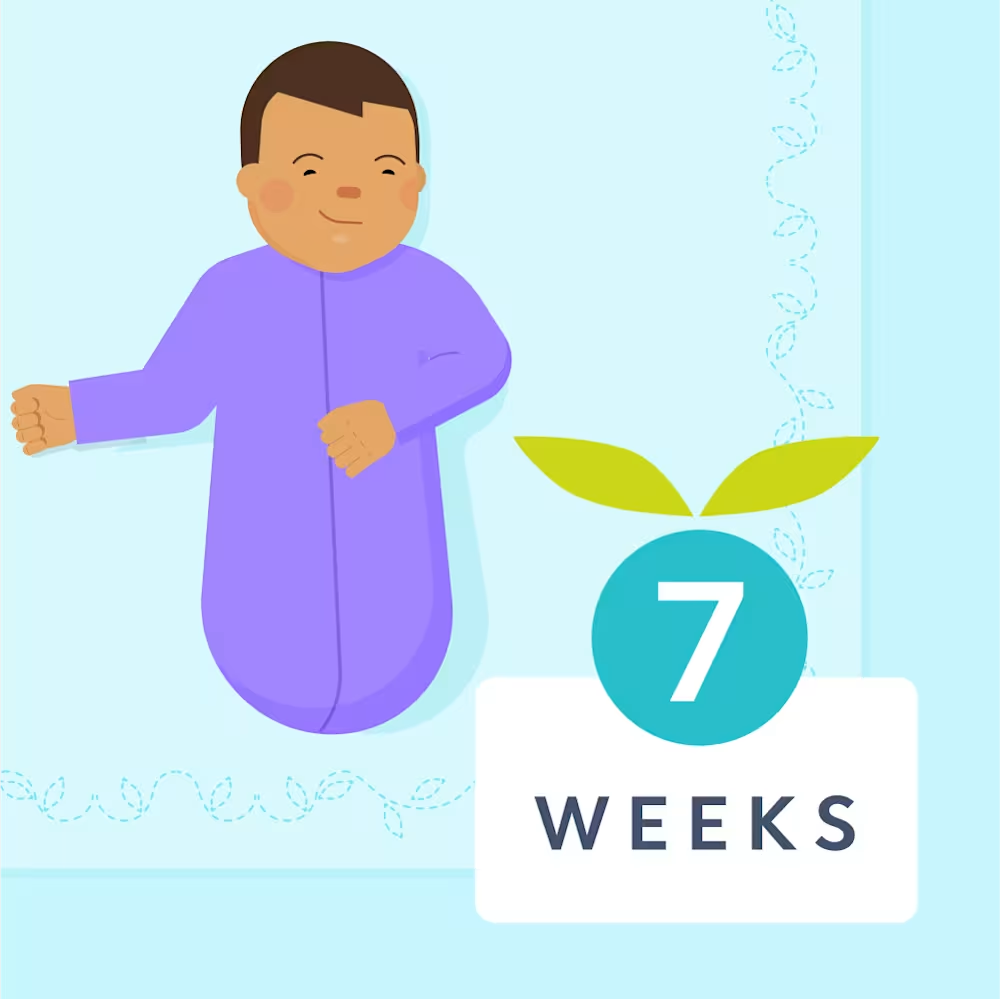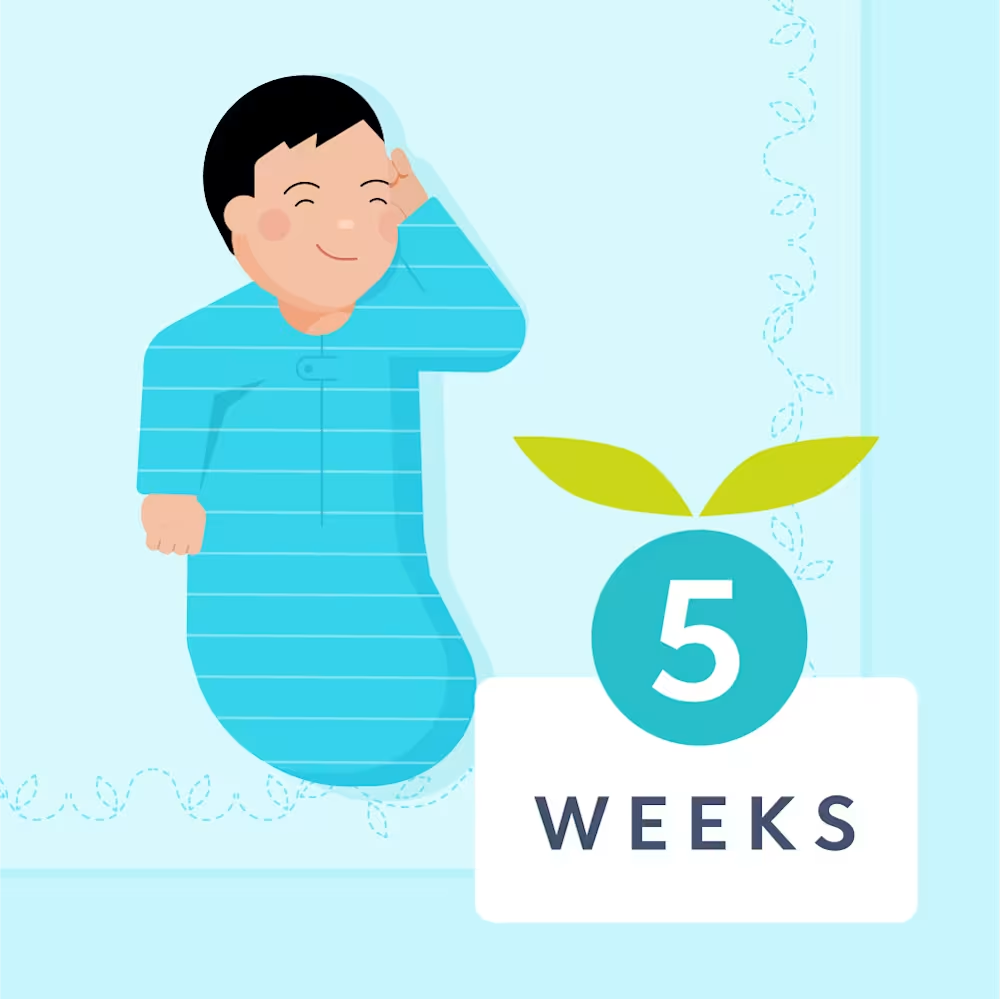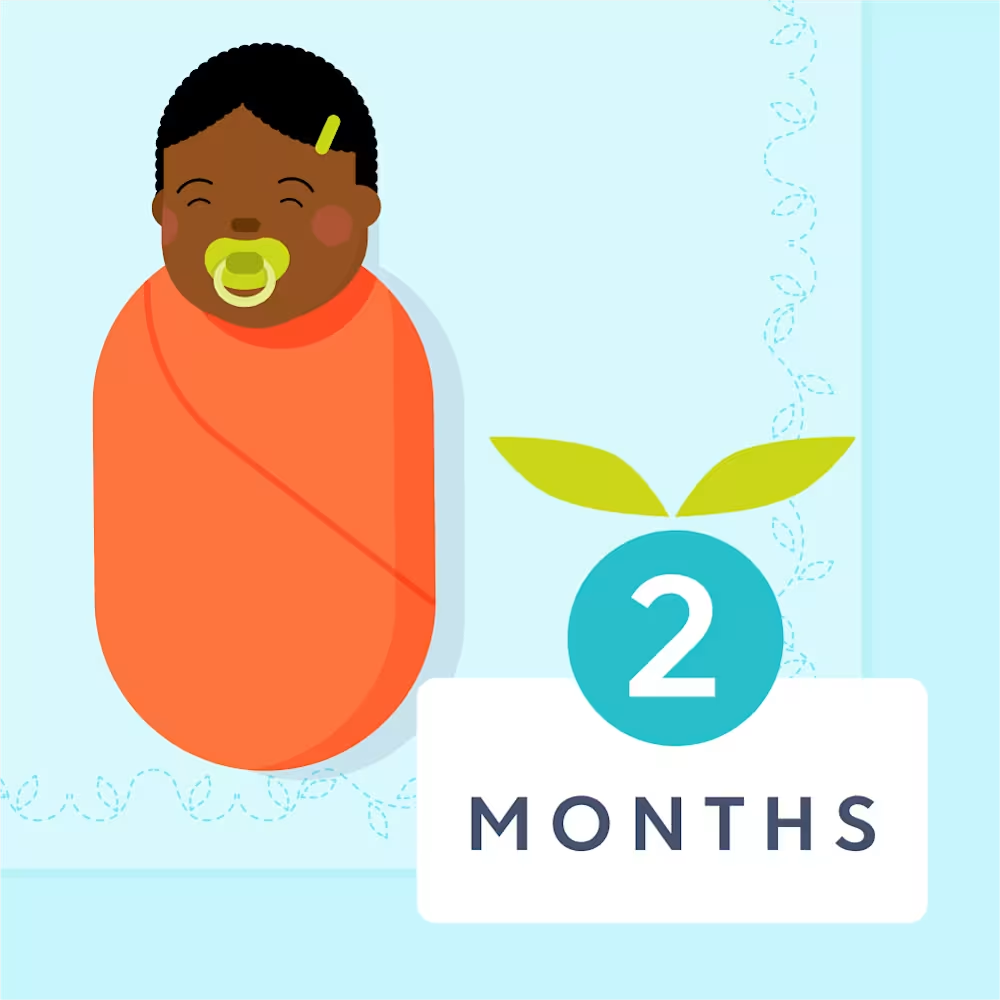6 week old sleep schedule: Bedtime and nap schedule
Updated Dec 15, 2025
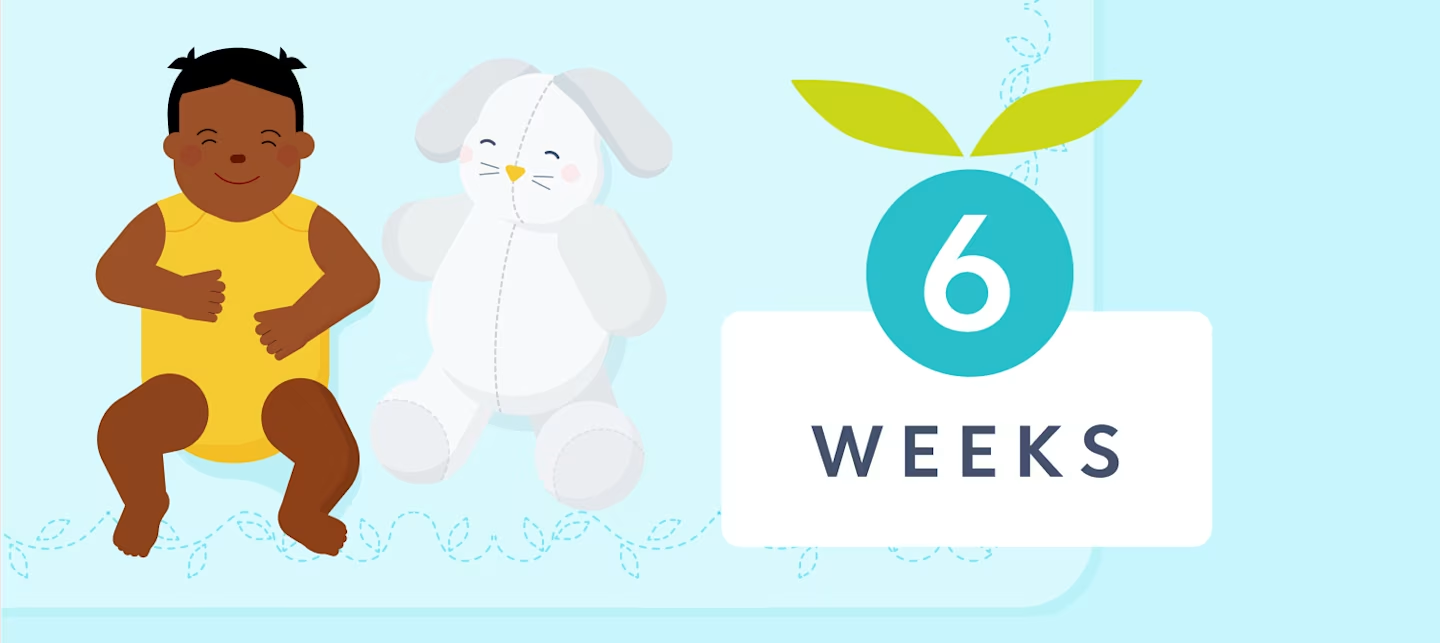
At 6 weeks, expecting the unexpected is likely still the name of the game when it comes to your newborn’s sleep. Babies at this age don’t have predictable sleep schedules — that’s normal! Both short and long naps are common and your little one will need to wake multiple times overnight for feedings and comfort.
Closer to old is when you may expect your child to have a more predictable 24-hour cycle of sleeping and eating.
In the article, we’ll go over what you may expect when it comes to 6 week old naps and overnight sleep and reassure you that you’re doing everything “right” to ensure your baby is getting the rest they need.
How much should a 6 week old sleep?
The American Academy of Pediatrics suggests that newborns sleep for about 16 - 17 hours per day []. At 6 weeks, sleep is likely still pretty unpredictable — naps may be anywhere from 30 minutes to 2 hours long, for example. Newborns also typically wake multiple times overnight for feedings and comfort. While this schedule (or lack of schedule) can be exhausting for caregivers, babies aren’t developmentally ready for a regular sleep and eating cycle until around .
Before your child is ready for a schedule, it can be especially helpful to pay attention to how long your little one can comfortably stay awake. At 6 weeks, are usually around 30 - 90 minutes before a baby is ready for sleep again. This is often enough time for a feeding, diaper change, a little tummy time, and then a snooze.
When caring for a newborn it can be easy to get caught up in sleep totals and hitting a specific number of naps. Of course, new parents want to be sure they’re doing everything they can for their young baby! However, keep in mind that every child is different and these sleep time recommendations are just estimates. Paying attention to your baby’s overall mood and energy levels can be a more effective way to determine if they’re getting enough rest overall.
Here's a quick overview of what you may expect when it comes to 6 week olds and sleep. Note that these figures are averages and should be used as guidelines.
Sample schedule for 6 week olds
At 6 weeks, your little one's "schedule" will likely still be unpredictable. Sleep times and durations will vary and this is normal! Here's what a day in the life of a 6 week old newborn may look like:
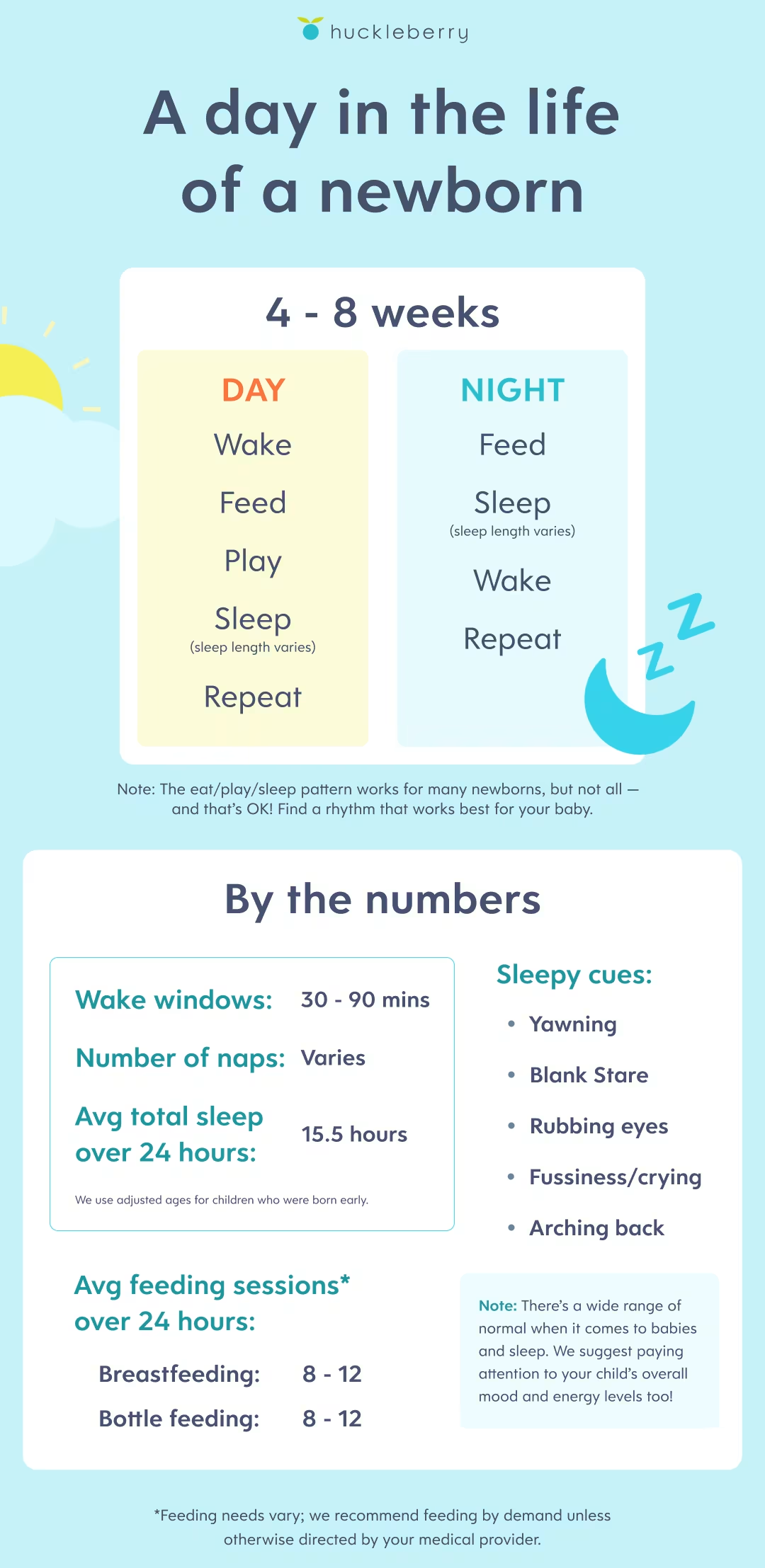
Top sleep tip for 6 week old
We don’t recommend trying to keep your baby awake for extra long stretches during the day in hopes of an earlier bedtime and more overnight sleep. Doing so can backfire and often leads to that makes it harder for a newborn baby to fall asleep and stay asleep. Instead, aim for adequate daytime sleep and rest assured that this exhausting period won’t last forever.
Naptime schedule for 6 weeks
How long should a 6 week old nap?
At 6 weeks, you may be hoping that your little one falls into more of a schedule. However, naps will likely still be at this age since timing and sleep durations can greatly vary for the first few months of your child’s life. Babies aren’t born with predictable or organized sleep cycles [] and we won’t expect a more regular nap pattern until closer to 3 - 4 months.
It’s not uncommon to see short naps and long naps at this point. Sometimes naps will be 30 minutes and other times they may be 2 hours — both would be considered normal at 6 weeks.
How many naps for a 6 week old?
You likely won’t be able to rely on a specific number of naps or a set sleep schedule when your baby is 6 weeks old. At this point, sleep is largely controlled by sleep pressure and hunger since their circadian rhythm [] is still developing.
Bedtime for 6 week olds
What time should a 6 week old go to bed?
Since your little one’s sleep is likely still pretty irregular, their longest stretch of sleep in a 24-hour period may begin around 9:00 or 10:00 PM — or sometimes later. And that’s OK! Babies may be ready for an earlier bedtime at around .
Due to an immature circadian sleep-wake system, sleep will likely be pretty evenly distributed between day and night. However, you may find that your newborn is still confusing night and day [] at 6 weeks and wanting to stay awake for long periods overnight and sleep longer during the day. This day/night reversal typically resolves by 8 weeks. However, if you want to help “fix” it faster, there are a couple of tricks to try.
We recommend keeping your child’s environment noisy and bright during the day and then quieting it down at night to set the tone for sleep. As much as possible, avoid stimulating [] or waking your baby when you feed or change them at night.
Why does my 6 week old keep waking up at night crying?
It’s entirely expected for a 6 week old to wake several times throughout the night. At this age, frequent wake ups are normal as babies need regular feedings and comfort. Most newborns aren’t physiologically capable of sleeping through the night until .
Is there a sleep regression at 6 weeks old?
At 6 weeks old, babies don’t typically experience sleep regressions because their sleep patterns are still irregular — there aren’t consistent rhythms yet to regress from. If your baby’s sleep suddenly changes, it’s often due to growth spurts, cluster feeding, or adjusting to life outside the womb rather than a true regression. It’s normal for a 6 week old to wake frequently throughout the day (and night). Most babies don’t develop more consistent 24-hour sleep and feeding cycles until closer to 3 - 4 months.
Can my 6 week old sleep with a pacifier?
Pacifiers are safe to use at 6 weeks and can usually be introduced from birth. However, if you're breastfeeding, the AAP advises waiting until nursing is well-established, which typically occurs around this time []. That said, there is little evidence to support that offering a pacifier too early leads to “nipple confusion” [].
In addition to offering comfort, pacifier use may help lower the risk of sudden infant death syndrome (SIDS). They are also frequently recommended for preterm or low-birth-weight babies to assist in developing their sucking reflex [].
Should I swaddle my 6 week old?
Swaddling a 6 week old can help them feel secure and promote better sleep. It can also prevent the Moro reflex from startling them awake [], potentially leading to longer sleep sessions.
Some things to remember when swaddling include:
Always place your baby on their back to sleep, whether swaddled or not, following AAP safety guidelines [].
Use “hip-healthy” swaddling methods that allow your baby’s legs to bend up and out naturally to reduce the risk of hip dysplasia [].
Stop swaddling as soon as your baby shows signs of rolling over, which can occur as early as 2 months.
Can I sleep train a 6 week old?
Sleep training for newborns. It's normal for young babies to need help from a caregiver to fall asleep and stay asleep! To help your baby , consider trying some of our for healthy newborn sleep hygiene.
Can a 6 week old sleep on their stomach or side?
A 6 week old should always be placed on their back to sleep on a firm, flat surface, as recommended by the AAP’s safe sleep guidelines []. Avoid placing them on their stomach or side. Once your baby is able to roll comfortably in both directions (back to front and front to back), you can allow them to sleep in the position they choose without needing to return them to their back.
What are the developmental milestones for a 6 week old?
Although your baby isn’t ready for major motor milestones like sitting or rolling during , there are many other exciting smaller developments to celebrate, like:
Regains birth weight by about 2 weeks then shows steady weight gain thereafter
Brings hands toward their eyes and mouth
Mostly keeps fists clenched
Exhibits newborn reflexes such as rooting, sucking, Moro (startle), grasping, and stepping reflexes
Does a 6 week old need to eat during the night?
It’s perfectly normal for newborns to wake several times overnight for feedings and comfort. At this age, their small stomachs can only hold limited amounts, so they need frequent feedings throughout the day and night. As your baby grows and their stomach capacity increases, they may start to sleep for longer periods overnight. However, many babies still require nighttime feedings until around 6 months [].
Takeaway
We recommend aiming for about 15.5 hours of total sleep in a 24-hour period for 6 week old babies. Since newborn sleep patterns are often unpredictable, there won’t be a consistent number of naps each day — every day will likely vary, and that’s completely normal!
At this age, babies can typically stay awake for 30 - 90 minutes at a time, though this can fluctuate throughout the day and from day to day. You may only have time for a feeding, diaper change, and a minute or two of tummy time before they're ready to sleep again!
If you find your little one likes to be awake for long stretches overnight, try keeping your child’s environment noisy and bright during the day and then quieting it down at night to set the tone for sleep. As much as possible, avoid stimulating or waking your baby when you feed or change them at night.
If you're curious about what lies ahead in the next month, glimpse into the future to see what you might experience once your baby is a . Take a look back at how far your baby has come by revisiting what they may have been like as a .
Share article:
Note: The content on this site is for informational purposes only and should not replace medical advice from your doctor, pediatrician, or medical professional. If you have questions or concerns, you should contact a medical professional.
11 Sources
Share article:
